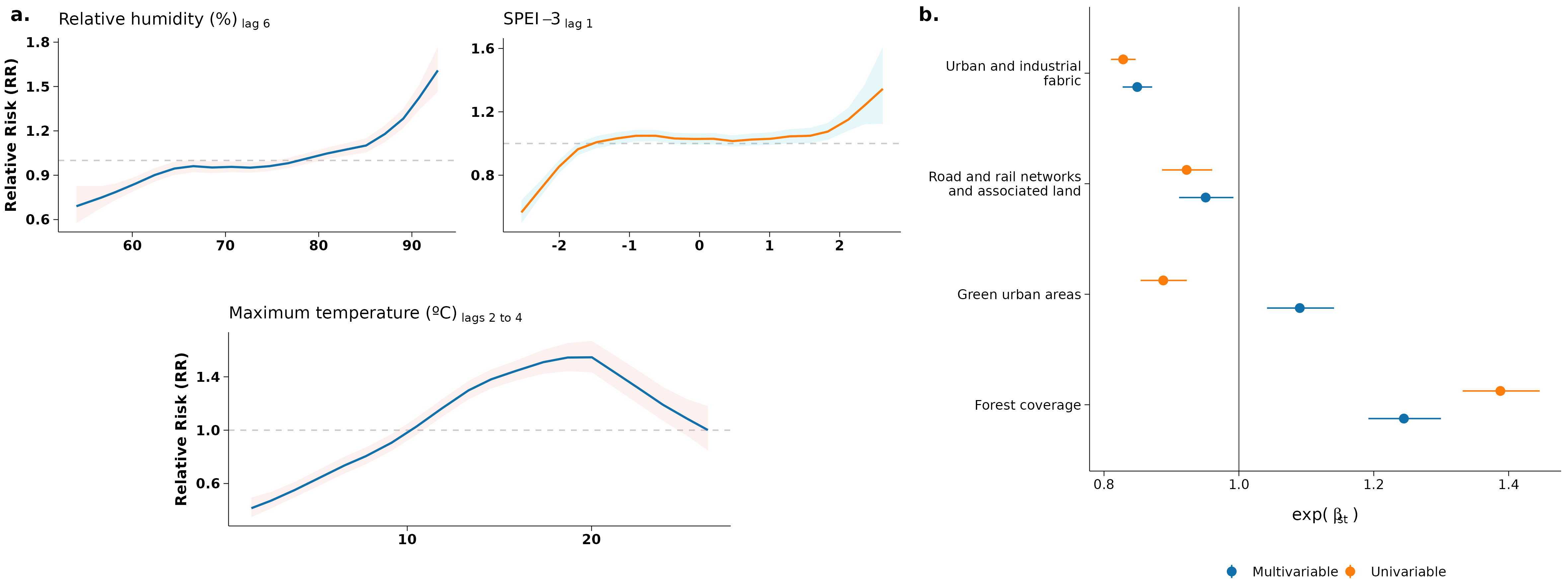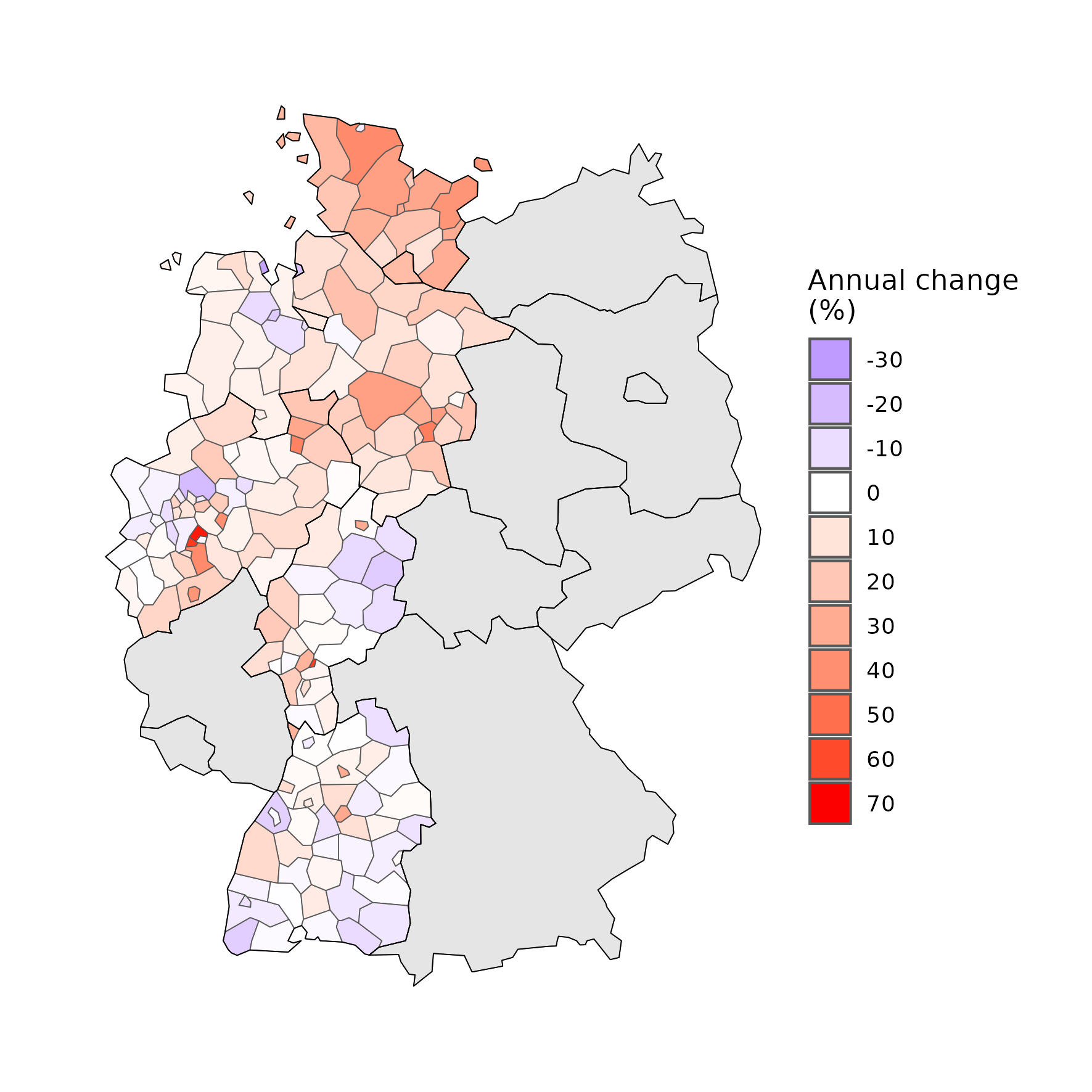Lyme borreliosis (LB) has been endemic in Germany for over two decades, with climate and environmental conditions playing a major role in tick activity and human exposure to bites. This study used a Bayesian modelling approach to explore how climate variability and land use change affect monthly LB case counts across German districts between 2009 and 2022. It examined delayed and non-linear relationships between these factors and LB risk, evaluated model performance, and predicted trends in states without mandatory reporting. The model was also used to estimate long-term temperature-related risk changes since the 1950s.
The findings show that warmer temperatures (10.5–26.3°C) two to four months prior, high humidity levels over 78.8% six months earlier, and very wet conditions one month prior were associated with increased LB risk. Humidity effects were significant only in areas suitable for deer, indicating a link with tick survival. The model identified rising LB trends in Schleswig–Holstein, Hamburg, and Lower Saxony—regions without mandatory reporting. An upward trend in temperature-related LB risk was observed across all federal states, with the sharpest increases in northern districts. This research highlights the importance of climate in shaping LB dynamics and supports expanding surveillance to better manage future tick-borne disease risks.

Relative contribution of variables to LB relative risk
|

Predicted annual change rate in areas without mandatory LB notification
|
## About this repository
This repository contains processed data suitable for building the models described in the associated publication, along with the code used for data processing, analysis, and visualisation of the model outputs.
* **01_data_cleaning:** scripts for processing data and generating maps.
* **02_analyses:** scripts for training models, analysing results, and generating predictions.
* **03_figures_and_tables:** scripts for producing the visualisations featured in the main manuscript and supplementary materials.
* **data:** processed datasets used for modelling and visualisation, along with instructions for obtaining the raw data.
* **functions:** custom functions for conducting analyses and creating visual outputs.
* **session_info:** information about the resources used in this repository.
## Developers
**[Martín Lotto Batista, PhD](https://www.bsc.es/lotto-batista-martin)**

\
Barcelona Supercomputing Center\
Global Health Resilience\
Email: martin.lotto@bsc.es
**[Prof. Rachel Lowe](https://www.bsc.es/lowe-rachel)**

\
Barcelona Supercomputing Center\
Global Health Resilience (Group leader)\
Email: rachel.lowe@bsc.es
## Contributors
**Stéphane Ghozzi, PhD**

\
World Health Organisation\
WHO Hub for Pandemic and Epidemic Intelligence\
Email: hello@stephaneghozzi.com
**Stefanie Castell, MD**

\
Helmholtz Centre for Infection Research\
Department for Epidemiology\
Email: stefanie.castell@helmholtz-hzi.de
**Rory Gibb, PhD**

\
University College London\
Centre for Biodiversity and Environment Research\
Department of Genetics, Evolution & Environment\
Email: rory.gibb.14@ucl.ac.uk
**Bruno Carvalho, PhD**

\
Barcelona Supercomputing Center\
Global Health Resilience\
Email: bruno.carvalho@bsc.es
**Balakrishnan Solaraju-Murali, PhD**

\
Barcelona Supercomputing Center\
Earth System Services\
Email: b.solarajumurali@zurich.com
**Prof. Stefan Flasche**

\
Charite-Universitaetsmedizin Berlin\
Centre for Global Health\
Email: Stefan.Flasche@charite.de


 \
Barcelona Supercomputing Center\
Global Health Resilience\
Email: martin.lotto@bsc.es
**[Prof. Rachel Lowe](https://www.bsc.es/lowe-rachel)**
\
Barcelona Supercomputing Center\
Global Health Resilience\
Email: martin.lotto@bsc.es
**[Prof. Rachel Lowe](https://www.bsc.es/lowe-rachel)**
 \
Barcelona Supercomputing Center\
Global Health Resilience (Group leader)\
Email: rachel.lowe@bsc.es
## Contributors
**Stéphane Ghozzi, PhD**
\
Barcelona Supercomputing Center\
Global Health Resilience (Group leader)\
Email: rachel.lowe@bsc.es
## Contributors
**Stéphane Ghozzi, PhD**
 \
World Health Organisation\
WHO Hub for Pandemic and Epidemic Intelligence\
Email: hello@stephaneghozzi.com
**Stefanie Castell, MD**
\
World Health Organisation\
WHO Hub for Pandemic and Epidemic Intelligence\
Email: hello@stephaneghozzi.com
**Stefanie Castell, MD**
 \
Helmholtz Centre for Infection Research\
Department for Epidemiology\
Email: stefanie.castell@helmholtz-hzi.de
**Rory Gibb, PhD**
\
Helmholtz Centre for Infection Research\
Department for Epidemiology\
Email: stefanie.castell@helmholtz-hzi.de
**Rory Gibb, PhD**
 \
University College London\
Centre for Biodiversity and Environment Research\
Department of Genetics, Evolution & Environment\
Email: rory.gibb.14@ucl.ac.uk
**Bruno Carvalho, PhD**
\
University College London\
Centre for Biodiversity and Environment Research\
Department of Genetics, Evolution & Environment\
Email: rory.gibb.14@ucl.ac.uk
**Bruno Carvalho, PhD**
 \
Barcelona Supercomputing Center\
Global Health Resilience\
Email: bruno.carvalho@bsc.es
**Balakrishnan Solaraju-Murali, PhD**
\
Barcelona Supercomputing Center\
Global Health Resilience\
Email: bruno.carvalho@bsc.es
**Balakrishnan Solaraju-Murali, PhD**
 \
Barcelona Supercomputing Center\
Earth System Services\
Email: b.solarajumurali@zurich.com
**Prof. Stefan Flasche**
\
Barcelona Supercomputing Center\
Earth System Services\
Email: b.solarajumurali@zurich.com
**Prof. Stefan Flasche**
 \
Charite-Universitaetsmedizin Berlin\
Centre for Global Health\
Email: Stefan.Flasche@charite.de
\
Charite-Universitaetsmedizin Berlin\
Centre for Global Health\
Email: Stefan.Flasche@charite.de
 # Modelling the impact of climate and the environment on the spatiotemporal dynamics of Lyme borreliosis in Germany
[](https://www.gnu.org/licenses/gpl-3.0) [](https://doi.org/10.5281/zenodo.15195878)
Data and R code to support Lotto Batista et al., (2025). Modelling the impact of climate and the environment on the spatiotemporal dynamics of Lyme borreliosis in Germany. *eBioMedicine*
To cite this repository:
> *Lotto Batista, M., Carvalho, B., Gibb, R., Solaraju-Murali, B., Flasche, S., Castell, S., Ghozzi, S., & Lowe, R. (2025). Data and R-code to accompany 'Modelling the impact of climate and the environment on the spatiotemporal dynamics of Lyme borreliosis in Germany' (1.0.0). Zenodo. https://doi.org/10.5281/zenodo.15195878*
## Summary
# Modelling the impact of climate and the environment on the spatiotemporal dynamics of Lyme borreliosis in Germany
[](https://www.gnu.org/licenses/gpl-3.0) [](https://doi.org/10.5281/zenodo.15195878)
Data and R code to support Lotto Batista et al., (2025). Modelling the impact of climate and the environment on the spatiotemporal dynamics of Lyme borreliosis in Germany. *eBioMedicine*
To cite this repository:
> *Lotto Batista, M., Carvalho, B., Gibb, R., Solaraju-Murali, B., Flasche, S., Castell, S., Ghozzi, S., & Lowe, R. (2025). Data and R-code to accompany 'Modelling the impact of climate and the environment on the spatiotemporal dynamics of Lyme borreliosis in Germany' (1.0.0). Zenodo. https://doi.org/10.5281/zenodo.15195878*
## Summary